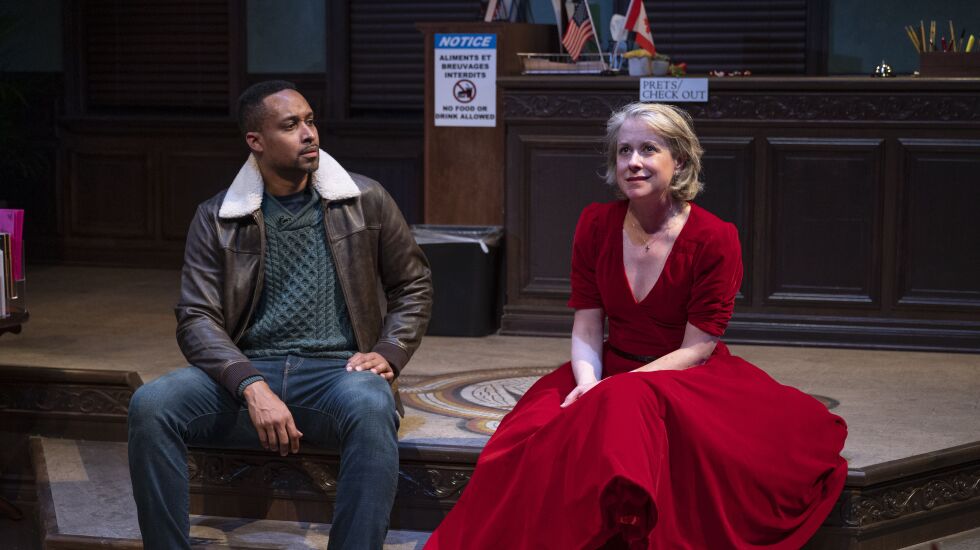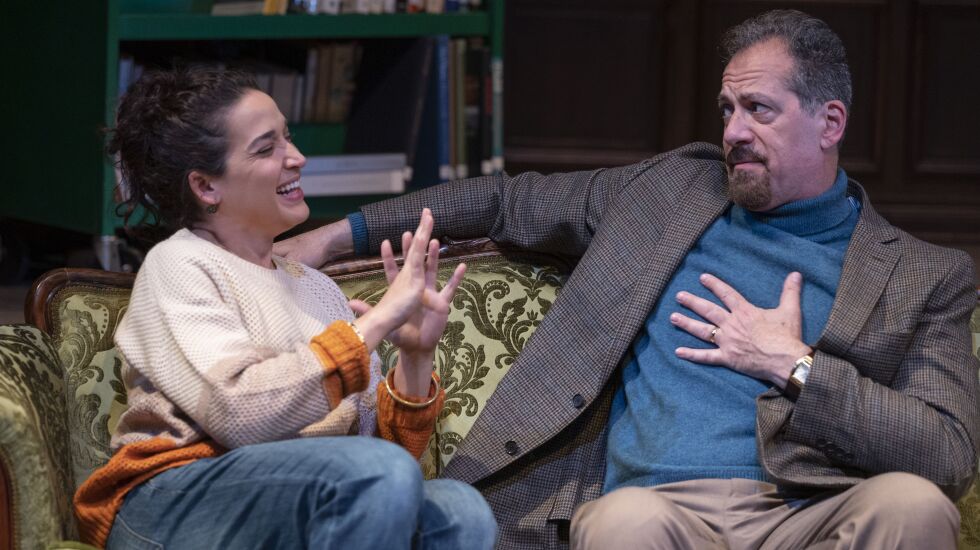
The most compelling aspect of “A Distinct Society,” receiving a sluggish production in its Midwest premiere at Writers Theatre, is its origin story. Inspired by true events that surely did call out for artistic treatment, the play takes place at a specific place and time.
The place: the Haskell Free Library, a genuine location built on the border of the United States and Canada. That borderline, an emblem of human division here in the form of a piece of tape, seems almost arbitrarily chosen (there is some concern about the sobriety of the civil engineers who created it), yet overflows with practical realities.
The time: The play is set during the effective days of Trump’s ban on individuals from Muslim countries. That policy involved a very-much-not-arbitrary categorization of people allowed or not allowed entry into the U.S. A political red-meat symbol to Trump’s “base,” the ban also overflowed with practical realities.
The rules we create to keep people apart find an exception in this place. With most of the building on the Quebec, Canada, side of the border, but the entrance in Vermont, people in both countries are allowed into the library without showing passports. It thus became a type of sanctuary for families whose members could not cross the border to meet. Suddenly, a sleepy library — usually a symbol for resolving misunderstanding and expanding empathy — became a source of controversy.
Playwright and director Kareem Fahmy uses this inspiration to weave a character-driven tale exploring physical, political and psychological divisions among people, which then generate individual moral dilemmas about allegiances.
At the center is French-Canadian librarian Manon (Kate Fry). She lords over her small book-filled territory, made as welcoming as possible, but with rules she has created and (mostly) eagerly enforces, namely no eating and drinking. These days, she is visited regularly by American border patrol agent Bruce (Amir Abdullah), who makes no secret of his romantic interest in Manon but justifies his frequent presence to enforce rules — namely a time limit and a strict prohibition on gift-giving — related to the politically problematic cross-border visitations.
In a play about rules and exceptions, the rules on food and gift-giving become tested quickly when Peyman (Rom Barkhordar), an Iranian doctor, arrives hoping to visit — and feed — his daughter Shirin (Alla Ayllam Peck), who has been in Boston on a student visa.

Everything that happens here is watched over, sometimes surreptitiously, by Declan (Cole Keriazakos), a 15-year-old who escapes parental neglect and school bullying to immerse himself in the Green Hornet comics Manon specially orders for him. Declan’s story — he came to Quebec as a baby — also brings into play the title. “A Distinct Society” refers to how separatists in Quebec like to think of their province in relation to the rest of Canada.
Fahmy has all the ingredients here for a fine dramatic feast, along with a capable cast, and it’s easy to keep waiting for the flavors to develop. But, alas, in this production they never do.
For much of its 100-minute running time, “A Distinct Society” feels like you are watching the characters explain themselves to themselves. Small details play largely like excuses to get someone on- or off-stage, and exposition only seems to set up more exposition, eventually setting up a climactic moment of drama that feels especially contrived.
The tone comes off uneasily. It’s a quirky small-scale comedy one moment (Fry, fresh off a tremendous performance in “The Cherry Orchard,” is the only one who lives in this world), a more emotional family drama the next, then yearns to be a poetic — and superhero-infused — take on the human condition. But it’s all bland.
The flirtation between Manon and Bruce never for a moment feels mutual. The same can be said of the friendship between Declan, so desperate for fatherly attention, and Bruce, a relationship we only really notice when it justifies a plot point.
And meanwhile, Peyman and Shirin’s story, the most realistically played, comes off as a series of bromides — not religious or cultural stereotypes, mind you, but father-daughter story cliches.
Individually each of the performers successfully commands a moment or two. But what’s missing is the relationships among them. This really does seem like the classic but unfortunate case of what can happen when writers direct their own work: a production that seems in love with the words being spoken and not the dramatic events they exist to create.



.png?w=600)



